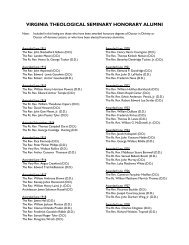Seminary Journal 2008 (August) - Virginia Theological Seminary
Seminary Journal 2008 (August) - Virginia Theological Seminary
Seminary Journal 2008 (August) - Virginia Theological Seminary
You also want an ePaper? Increase the reach of your titles
YUMPU automatically turns print PDFs into web optimized ePapers that Google loves.
“The change in vision that we need is like the theological shift<br />
between the old law and the new law, where, instead of trying to<br />
defi ne correct behavior, Christ, the source of living water, tells us that<br />
we must re-form our hearts to be in right relation to our neighbors.”<br />
to humanity against the value of the<br />
existence of a species. Protection of the<br />
species must be ensured, and the costs<br />
to particular human beings for that<br />
protection are irrelevant. The implication<br />
is that the existence of a species is<br />
inherently and infi nitely valuable. No<br />
amount of human benefi t can equal it.<br />
In my experience, everyone<br />
involved with Endangered Species Act<br />
confl icts is stirred spiritually by this<br />
stark assertion of the value of the nonhuman<br />
creation. For years I have been<br />
working on the confl icts over the use<br />
of the waters of the Rio Grande in New<br />
Mexico. The parties to those confl icts<br />
come from every part of the community,<br />
even including the non-human community,<br />
as endangered species are often<br />
the plaintiffs in lawsuits. I worked on<br />
one case that was called The Rio Grande<br />
Silvery Minnow against the United States<br />
of America, which seemed an unequal<br />
contest. At the negotiating table in that<br />
case were cities, farmers, Native American<br />
Pueblos, environmentalists, irrigation<br />
ditches, rafting and fi shing groups,<br />
artists, state and federal governments.<br />
Each of these expressed legal positions<br />
in secular, often monetary terms,<br />
but everyone I knew saw the issues in<br />
spiritual terms also. Who gets the water<br />
is a matter of life and death, so that,<br />
whether approached from a religious<br />
standpoint or a secular one, people<br />
hear the question being asked of what<br />
is the right relation between humanity<br />
and creation.<br />
If, when sitting at that table<br />
together, all we perceive are too many<br />
individuals competing for private<br />
property rights in the shrinking resources<br />
of the world, it is hard to value<br />
each other. In addition to this, when<br />
the needs of the non-human world join<br />
the competition, people must contend<br />
with feeling less valued than a fi sh. All<br />
the painful centuries of striving to follow<br />
as a moral precept the commandment<br />
to love one another, all the work<br />
of hearing hopefully that God cares<br />
more for each of us than for the sparrow—these<br />
things seem threatened or<br />
refuted by the suggestion that there are<br />
too many of us and we must give way<br />
to the needs of animals and trees. Just<br />
as in the time of Copernicus, we feel<br />
pushed out of the place we thought we<br />
had at the center of creation.<br />
We are all at that table today,<br />
feeling uncertainty and pain. So far, the<br />
strategy of environmental law and policy<br />
in this crisis has been to try hard to<br />
hold on to notions of private property,<br />
while making concessions to notions of<br />
commonality only to the extent we absolutely<br />
must. Environmental theology<br />
would do something of the same if it<br />
only condemned environmental damage<br />
as a sin, without offering a different<br />
vision of how to relate to the world. I<br />
believe that a theology of water holds<br />
hope. The very nature of water refutes<br />
the idea that we can divide up the<br />
world into private, static portions, and<br />
each enjoy alone our separate property.<br />
Instead the fl ow between us and all of<br />
creation calls on us to acknowledge,<br />
protect and celebrate that fl ow. The<br />
change in vision that we need is like<br />
the theological shift between the old<br />
law and the new law, where, instead<br />
of trying to defi ne correct behavior,<br />
Christ, the source of living water, tells<br />
us that we must re-form our hearts to<br />
be in right relation to our neighbors.<br />
In the same way, we must abandon<br />
the effort to parse out exactly what our<br />
correct share of the world’s resources<br />
should be. Rather, we should be asking,<br />
in a living way, what our role in the<br />
world’s eco-system should be.<br />
This metaphor of an ecosystem<br />
leads to an answer to that question<br />
that brings together a biological and<br />
spiritual understanding. The phrase<br />
that biologists would use for what I<br />
have called “the role of humanity in<br />
the world’s eco-system” is “biological<br />
niche.” This means that, like other<br />
creatures, we occupy a particular niche<br />
and have a particular function in the<br />
system. The biological niche of humanity,<br />
given by God in Genesis, is that of<br />
the steward and gardener. The present<br />
environmental crisis underscores<br />
the fact that this is our role, as it is up<br />
to us to protect the world. In the role<br />
of steward and gardener we are in<br />
the image of God because we are the<br />
ones who are self-aware, with the gift<br />
of choice. When we choose to fi ll our<br />
role, we actively care for other living<br />
things. The model for our so-called<br />
“dominion” of the earth is Christ, who<br />
exercised His kingship in service. The<br />
50 VIRGINIA SEMINARY JOURNAL AUGUST 2007



